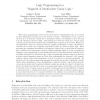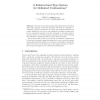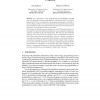550 search results - page 4 / 110 » Context Semantics, Linear Logic and Computational Complexity |
111
Voted
LICS
1991
IEEE
15 years 3 months ago
1991
IEEE
When logic programming is based on the proof theory of intuitionistic logic, it is natural to allow implications in goals and in the bodies of clauses. Attempting to prove a goal ...
103
Voted
TLCA
2007
Springer
15 years 5 months ago
2007
Springer
We propose type systems that abstractly interpret small-step rather than big-step operational semantics. We treat an expression or evaluation context as a structure in a linear log...
CSL
2008
Springer
15 years 1 months ago
2008
Springer
We present a game-based semantic framework in which the time complexity of any IMELL proof can be read out of its interpretation. This gives a compositional view of the geometry of...
LPNMR
2005
Springer
15 years 5 months ago
2005
Springer
Two approaches to logic programming with probabilities emerged over time: bayesian reasoning and probabilistic satisfiability (PSAT). The attractiveness of the former is in tying ...
102
Voted
ICAIL
2005
ACM
15 years 5 months ago
2005
ACM
Computational law is an approach to automated legal reasoning focusing on semantically rich laws, regulations, contract terms, and business rules in the context of electronicallym...



